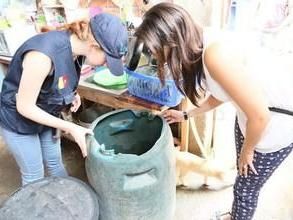Breakthroughs in Chikungunya Research Led by A*STAR Scientists Spell New Hope for Better Treatment and Protection
Recent breakthroughs in Chikungunya research spearheaded by scientists at A*STAR's Singapore Immunology Network (SIgN) have made great strides in the battle against the infectious disease. Working in close collaborations with Singapore clinician-scientists and international researchers, Dr Lisa Ng, Principal Investigator of the Chikungunya research group at SIgN, led the team to discover a direct biomarker which serves as an early and accurate prognosis of patients who have a higher risk of the more severe form of Chikungunya fever (CHIKF). This means that doctors can now quickly and accurately identify patients at risk, facilitating a more targetted treatment and clinical care at the onset of the disease.
CHIKV infection is characterised by an abrupt onset of fever frequently accompanied by severe muscle and joint pains. Though most patients recover fully within a week, in severe cases, the joint pains may persist for months, or even years. For individuals with a weak immune system, the disease can result in death. With no clinically-approved vaccine or treatment for Chikungunya fever, it remains a worrying public health problem.
To devise strategies to stop CHIKV transmission, Dr Ng's team collaborated with Professor Leo Yee Sin and Dr Angela Chow, clinician-scientists from the Communicable Disease Centre (CDC) at Tan Tock Seng Hospital, to study how the human body responds to CHIKV infection. The team conducted a comprehensive study on the antibody response against CHIKV in patients. They discovered that patients who respond to the disease at the onset with high levels of Immunoglobulin G3 (IgG3), a naturally-acquired antibody, are protected from the more severe form of Chikungunya fever, characterised by persistent joint pains. On the other hand, patients with a delayed IgG3 response generally have less acute symptoms at the start, but are more susceptible to chronic debilitating joint pains at later stage of the disease. Hence, the IgG3 antibodies serve as a specific biomarker of patients with increased risk of the severe form of the disease.
Collaborating with computational experts from A*STAR's Institute for Infocomm Research (I2R), Dr Ng's team also uncovered that a very small defined segment of the Chikungunya viral protein, named "E2EP3", was able to induce the natural IgG3 protective response in preclinical models. They found that mice vaccinated with the E2EP3 peptides were protected against CHIKV with significant reduction in viral counts and joint inflammation. This finding raises hope for a new effective Chikungunya vaccine that can offer protection against Chikungunya virus in the event of an outbreak.
Dr Ng said, "Long-term treatment required for the chronic joint pain in Chikungunya-infected patients places social and economic burden for both patients and the public healthcare system. We are excited that the mechanistic insights gained through our collaborative research with the local hospitals and international research partners have led to discovery of 'new weapons' to tackle Chikungunya more effectively."
Scientific Director of SIgN, Professor Paola Castagnoli said, "With increasing threat of Chikungunya virus infection, particularly in Asia and the Pacific region, this significant breakthrough is a step forward in enhancing our pandemic preparedness against the infectious disease. This is a testament to the successful collaborations between research scientists and clinicians in translating scientific discoveries into impactful healthcare solutions for the benefit of Singapore and beyond."
Other news from the department science

Get the life science industry in your inbox
By submitting this form you agree that LUMITOS AG will send you the newsletter(s) selected above by email. Your data will not be passed on to third parties. Your data will be stored and processed in accordance with our data protection regulations. LUMITOS may contact you by email for the purpose of advertising or market and opinion surveys. You can revoke your consent at any time without giving reasons to LUMITOS AG, Ernst-Augustin-Str. 2, 12489 Berlin, Germany or by e-mail at revoke@lumitos.com with effect for the future. In addition, each email contains a link to unsubscribe from the corresponding newsletter.






















































